I am learning Solidity.
I wrote solidity code using openzeppelin and compile it using solcjs.
It returns multiple bytecode for main.sol and imported other sol file.
should I deploy only bytecode for main.sol? (main.sol bytecode contains other sol files bytecode?)
I am not a native english speaker, so please forgive me my weird english.
pragma solidity ^0.8.0;
import "./contracts/token/ERC721/extensions/ERC721URIStorage.sol";
import "./contracts/utils/Counters.sol";
import "./contracts/access/Ownable.sol";
contract Name is ERC721URIStorage,Ownable {
using Counters for Counters.Counter;
Counters.Counter private _tokenIds;
constructor() ERC721("Name", "name") {}
function mint(address nftowner)
public
onlyOwner
returns(uint256)
{
uint256 newItemId = _tokenIds.current();
_mint(nftowner, newItemId);
_setTokenURI(newItemId, "https://example.com");
_tokenIds.increment();
return newItemId;
}
}

